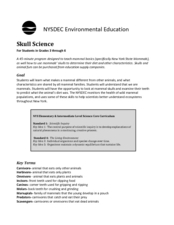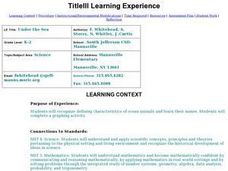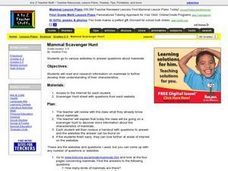Curated OER
Skull Science
What can your class learn from a skull? With proper facilitation, they can learn about diet, physical adaptations, special differences, and even the environment. Pupils will examine a series of mammal skulls and pelts to help them...
Curated OER
The Five Classes of Vertebrates
What a terrific lesson! Learners discuss the animal kingdom, and classify them as vertebrates and invertebrates. They also identify them as fish, amphibians, reptiles, birds, and mammals. There is even a taxonomic breakdown of popular...
Curated OER
Mammal Study Merit Badge Workbook
In this Boy Scout Mammal Study merit badge activity, students complete 5 pages of multiple step short answer questions associated with the characteristics of mammals in order to earn a merit badge. They list animal classification, follow...
Curated OER
Mammal Characteristics
In this mammals worksheet, students review the characteristics of mammals including their adaptations for survival and reproductive strategies. This worksheet has 2 short answer, 5 matching, 5 fill in the blank, 8 true or false, and 4...
Curated OER
What's A Mammal?
Students examine mammals understanding what a mammal is and reviewing the eleven mammal groups. In this science lesson, students play a game known as Mystery Mammal Game. Yet, first students research about the mammal and then give...
Curated OER
What Kind Of Mammal Is It?
Students describe the characteristics of a mammal. They also differentiate between a companion and a wild animal. The lesson has an assessment included in it. They have a discussion to tap prior knowledge about what a mammal is.
Curated OER
Under the Sea - Ocean Mammals/Fish
Students explore the similarities and differences between ocean mammals and fish. The characteristics of the life forms observed are placed onto a graph. The classroom becomes the botom of the sea and is explored to gain the required data.
Curated OER
Mammals Have Fur
First graders study animals. In this animal classification lesson, 1st graders explore the characteristics (primarily fur) that distinguish animals as mammals. They work in groups at various stations that practice this classification...
Curated OER
Mammals Have hair or Fur
First graders complete computer activities, make a mask, separate pictures, and more having to do with mammals. In this mammals lesson plan, 1st graders classify animals as being mammals or non mammals based on their hair or fur.
Curated OER
Mammal Scavenger Hunt
Students use the internet to answer their questions about mammals. They complete a scavenger hunt worksheet to identify their characteristics. They ask any questions they have at the end of the instructional activity.
Curated OER
What are Mammals?
Pupils differentiate between wild and tame animals, explain how to classify mammals into groups based on common charactertistics and comprehend the values of zoos. They listen as the teacher reads Psalm 50:10 and explains that all of the...
Curated OER
Mammals - Habitat/diversity Learning Cycle Lesson Plan
Ninth graders explore the characteristics and diversity of mammals, including key adaptations.
Curated OER
Science Talk about Mammals and Reptiles/Amphibians
Third graders use the internet to research mammals, reptiles and amphibians. They list important items about their chosen animal. Students identify characteristics of an animal and where they live. They classify animals as a mammal,...
Curated OER
Animal Classification
Second graders identify characteristics of and group animals by the five categories of vertebrates.
Curated OER
What's a Mammal?
Students research his or her assigned mammal using print and online resources. In this mammals research lesson, students discover mammals have certain traits that distinguish them from animals in other classes, such as fish,...
Curated OER
Animal Classification
Third graders differentiate between vertebrates and invertebrates, and identify the main characteristics of mammals, fish, reptiles, amphibians, and birds. They sort and categorize different types of balls, discuss the characteristics...
Curated OER
Observations of a Mammal
Observations are a key step in the scientific method. In a fun activity, kids learn more about a mammal that they know, such as their own cat, a class hamster, or a friend's dog, through making detailed observations. In addition, they...
McGraw Hill
Chapter 21: Mammals
Although the worksheet found here is designed to accompany a particular textbook reading, it is a good basic review or study guide when learning about mammals. If you have a text that covers these concepts, young scientists can use the...
Curated OER
How Are Animals Grouped?
In this animal grouping worksheet, students compare and contrast the characteristics of mammals, birds, and fish. This worksheet has 9 fill in the blank questions in a graphic organizer.
Curated OER
Characteristics of Reptiles Lesson Plan
First graders draw pictures of reptiles and share them with the class describing the characteristics of the reptile. In this reptiles lesson plan, 1st graders determine if animals in pictures are reptiles or not.
NOAA
Vertebrates II
Mammals of the ocean unite! Or not. The 20th installment of a 23-part NOAA Enrichment in Marine sciences and Oceanography (NEMO) program investigates how warm-blooded marine mammals survive in water. In the class activity, learners use...
Curated OER
Australian Mammals: Evolultionary Development as a Result of Geographic Isolation
Pupils examine the differences between monotremes, marsupials, and placental mammals and are able to contrast these organisms with other mammals. They learn about unique variation and the diversity of mammals located in Australia.
Curated OER
Diversity of Mammals
In this mammals instructional activity, high schoolers compare and contrast the three types of mammals: placental, marsupial, and monotreme. This instructional activity has 4 short answer, 12 matching, and 8 fill in the blank questions.
Curated OER
Mammal Characteristics
For this mammal characteristics, students study diagrams to compare the different types of teeth found in herbivores and carnivores. This worksheet has 1 short answer and 2 multiple choice questions.

























